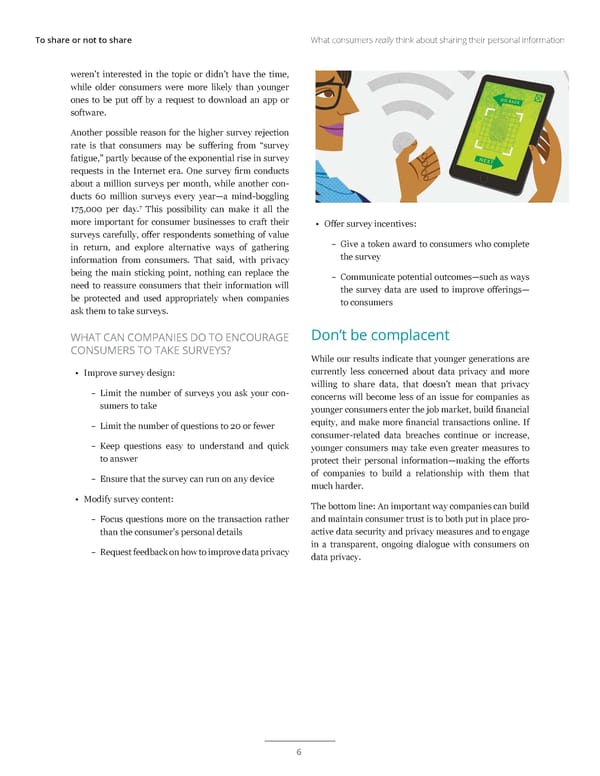To share or not to share What consumers really think about sharing their personal information weren’t interested in the topic or didn’t have the time, while older consumers were more likely than younger ones to be put off by a request to download an app or software. Another possible reason for the higher survey rejection rate is that consumers may be suffering from “survey fatigue,” partly because of the exponential rise in survey requests in the Internet era. One survey firm conducts about a million surveys per month, while another con- ducts 60 million surveys every year—a mind-boggling 7 175,000 per day. This possibility can make it all the more important for consumer businesses to craft their • Offer survey incentives: surveys carefully, offer respondents something of value in return, and explore alternative ways of gathering – Give a token award to consumers who complete information from consumers. That said, with privacy the survey being the main sticking point, nothing can replace the – Communicate potential outcomes—such as ways need to reassure consumers that their information will the survey data are used to improve offerings— be protected and used appropriately when companies to consumers ask them to take surveys. WHAT CAN COMPANIES DO TO ENCOURAGE Don’t be complacent CONSUMERS TO TAKE SURVEYS? While our results indicate that younger generations are • Improve survey design: currently less concerned about data privacy and more – Limit the number of surveys you ask your con- willing to share data, that doesn’t mean that privacy sumers to take concerns will become less of an issue for companies as younger consumers enter the job market, build financial – Limit the number of questions to 20 or fewer equity, and make more financial transactions online. If consumer-related data breaches continue or increase, – Keep questions easy to understand and quick younger consumers may take even greater measures to to answer protect their personal information—making the efforts – Ensure that the survey can run on any device of companies to build a relationship with them that much harder. • Modify survey content: The bottom line: An important way companies can build – Focus questions more on the transaction rather and maintain consumer trust is to both put in place pro- than the consumer’s personal details active data security and privacy measures and to engage – Request feedback on how to improve data privacy in a transparent, ongoing dialogue with consumers on data privacy. 6
 DUP: To Share Or Not To Share Page 5 Page 7
DUP: To Share Or Not To Share Page 5 Page 7